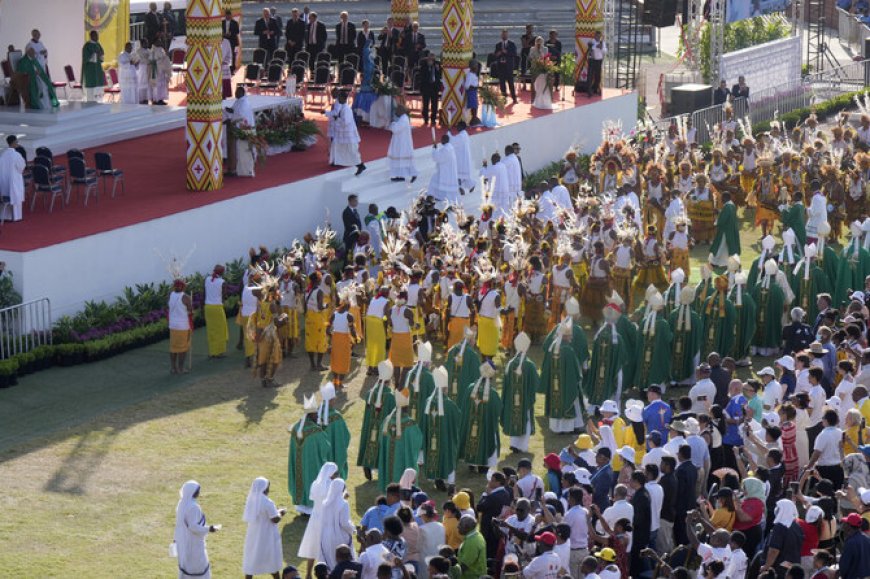In a significant demonstration of his long-held commitment to supporting the marginalized, Pope Francis celebrated Mass in Papua New Guinea's capital, Port Moresby, on Sunday, before flying to one of the nation's most remote regions with a ton of humanitarian aid. The Pope’s visit emphasized his focus on the Church's peripheries—communities that are geographically and spiritually distanced from the traditional centers of Catholicism.
An estimated 35,000 faithful gathered at Sir John Guise Stadium in Port Moresby for the morning Mass, which began with traditional dancers adorned in grass skirts and feathered headdresses, moving to the rhythm of drums. Priests in green vestments led the procession as the Pope addressed the congregation.
In his homily, Pope Francis spoke of the physical and spiritual isolation that many in Papua New Guinea experience. “You who live on this large island in the Pacific Ocean may sometimes have thought of yourselves as a far away and distant land, situated at the edge of the world,” he said. “Yet today, the Lord wants to draw near to you, to break down distances, to let you know that you are at the center of his heart and that each one of you is important to him.”
Following the Mass, the Pope embarked on a mission to Vanimo, a remote coastal city in the northwest region of Papua New Guinea. This small community of 11,000 residents, known for its surf spots, is served by missionaries from the Pope’s native Argentina. The visit symbolized the Pope’s ongoing dedication to the global Catholic community, particularly in regions often overlooked.
Humanitarian Aid to Remote Communities
Pope Francis arrived in Vanimo aboard an Australian military aircraft, bringing with him one ton of humanitarian aid. The aid included medicine, clothing, and toys for children, intended to assist the underserved communities in the area. This vital support was coordinated through the Vatican, with the involvement of Father Alejandro Diaz, an Argentine missionary, who had previously prepared the aid during a visit to Rome.
Vanimo, a small and isolated town near Papua New Guinea's border with Indonesia, is emblematic of the type of community the Pope has championed throughout his papacy. His mission aligns with his broader philosophy of prioritizing the “peripheries” of society, where the Church can play a crucial role in supporting vulnerable populations.
Addressing Prejudice and Superstition
During his trip, Pope Francis also focused on the challenges faced by women in Papua New Guinea, where accusations of witchcraft and sorcery remain prevalent. Many women are falsely accused, ostracized by their families, and subjected to violence due to deeply rooted superstitions. On Saturday, Francis met with local church leaders, urging them to stand with those marginalized by such harmful practices.
“I think too of the marginalized and wounded, both morally and physically, by prejudice and superstition sometimes to the point of having to risk their lives,” he said in his remarks to bishops, priests, and nuns. The Pope urged the Church to offer “closeness, compassion, and tenderness” to those in need, particularly those victimized by these baseless accusations.
A Global Pilgrimage
Pope Francis’ stop in Papua New Guinea was part of a broader four-nation tour of Southeast Asia and Oceania. His journey, which began in Indonesia, highlights his emphasis on fostering relationships with Catholic communities in distant regions. After departing Papua New Guinea, he will visit East Timor before concluding his trip in Singapore later this week.
With a Catholic population of approximately 2.5 million in Papua New Guinea, the Pope’s visit serves as a significant spiritual moment for the faithful, who often navigate the complexities of practicing their faith alongside indigenous traditions such as animism and sorcery. His message of unity, compassion, and outreach to the marginalized resonated deeply in a region where many feel distant from the institutional Church.
Pope Francis’ trip exemplifies his enduring mission: to bring the love and support of the Church to all corners of the globe, ensuring that no community, no matter how remote, is forgotten.














































